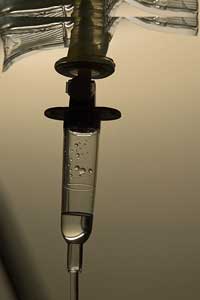We’re stuck in the doldrums as the federal level with little funding and little support but that doesn’t mean stagnation. With several major studies wrapping up 2013 will be a very important year for this disorder. Check out some of the events and studies to look forward to this year.
FDA Decision on Ampligen
- Date: Anytime Now

Support the effort to get Ampligen into the hands of the ME/CFS community here...
January 14th – CDC and Dr Klimas Present..
- Call number: 800-619-4306
- Participant Code: 6023819
The CDC will feature their latest research and a talk by Dr. Nancy Klimas on “Redefining Exercise in CFS through Reconstruction of Aerobic Capacity” in an open phone call from 3-4 pm (EST) on January 14th. Exercise studies show aerobic capacity is impaired in many people with ME/CFS and a significant repair (or ‘reconstruction’) of aerobic capacity would conceivably allow people to exercise more vigorously (actually ‘exercise’). How significant a ‘reconstruction of aerobic capacity’ Dr. Klimas is talking about, however, is unclear.
She and her exercise physiologist, Connie Sole (MS) have been at the forefront of exercise testing and in developing very mild ‘exercise’ programs using heart rate monitors to enhance fitness and health. Dan Moricoli’s videos have shown that they’ve had some real success.
Jan 26th – A Celebration! Dr. Klimas’s Coming Out Party at NSU
Titled CFS/ME and Gulf War Illness 2013 – A Celebration of Hope and Progress, Dr. Klimas’s first public ME/CFS Conference with Nova Southeastern takes place on Jan 26th in Fort Lauderdale, Fl. This 9-5 conference with a reception afterwards features a great lineup including Dr. Peterson, Dr. Broderick and Dr. Mady Hornig of the Chronic Fatigue Initiative (CFI).
Some of the more interesting talks will be Dr. Hornig’s talk on ‘Pathogens and Autoimmunity’ and two treatment talks; Dr. Broderick’s talk on zeroing in on new treatment options and Dr. Peterson’s talk on ‘The Latest Interventions in Trial’. I hear rumors of some exciting news to come put of the meeting but we shall see.
The event won’t be broadcast live but I’ll be there and Dan Moricoli of the ME/CFS Community Center will videotape it.
FDA Stakeholders Chronic Fatigue Syndrome Meeting
- Date Due – Sometime in Spring
The big drug question -Ampligen- will be wrapped up by Spring (it seems), but there’s still the matter of future drugs (may they take less than 20 years to get through the FDA (lol)) and that’s what the FDA Stakeholder’s Meeting will be about. This is the first FDA Stakeholders Meeting for a disease since HIV/AIDS back in the 80’s/90’s, just getting the FDA to hold it was a major accomplishment.
Among other things the meeting will provide clarity for drug manufacturers on what they need to do prove their drugs work in ME/CFS and will have to tackle stickysubset and definition issues. Above all, we want it to produce a roadmap that will help future drug manufacturers avoid what Hemispherx went through when they bounced from division to division, having to deal with different standards and guidelines at every turn. (If drug manufacturers weren’t turned off to chronic fatigue syndrome before examining Hemispherx’s path, they probably were afterwards) Like any company developing long term projects, they need to know that the rules are not going to change on them in midstream.
The meeting should also send a clear signal to drug manufacturers that the FDA is going to do what it can to support drug development for this disorder.
Invest in ME Annual Conference
- Due Date – May 31st, Westminister, London
The agenda has not been announced but this conference seems to get better every year with Invest in ME always finding top-notch speakers
Comprehensive Autonomic Nervous System Research and Treatment Trial… Saline Finally Gets Its Day
- Location: Vanderbilt University, Nashville, Tenn, US
- Project Completion Date: July, 2013
This study took a more comprehensive look at sympathetic nervous system functioning than we’ve seen before. These researchers believe toning down sympathetic nervous system activity will improve symptoms, reduce inflammation and oxidative stress and increase blood volume. They tested autonomic and immune system functioning and oxidative stress levels while giving POTS and non-POTS (CFS) patients a variety of drugs (methyldopa, saline infusions and L-NMMA trimethaphan).
Saline solution has been used for years in ME/CFS and it’s nice to see it get its day in court, so to speak, and it was good to see Dr. Biaggioni directly reference Dr. Bell’s reports on saline in his application.
If the results are positive this study will be a major step forward in several ways. Besides validating the use of saline in ME/CFS and opening that treatment possibility for patients across the country, documenting sympathetic nervous system dysfunction should lead to more research into what may be a core feature of this disorder.
This big, rigorous and multi-faceted study is what an NIH study typically looks like. We don’t get many of them and its great to get them when we do. Dr. Renee Taylor recently completed a series of post-infectious mononucleosis papers that came out of a large NIH grant and I’ll cover those shortly. (Her results pointed to the ANS as well).
The Biaggioni, Taylor and Baraniuk studies all came out of the Neuroimmune grant opportunity in 2006 and are all wrapping up around now. By all rights the 2010 State of the Knowledge Workshop should have lead to a similar grant opportunity but it didn’t.
New Drug Options for Chronic Fatigue Syndrome Due This Year
- CFIDS Associations Drug Repurposing Study Wrapping Up
- Due Date – Sometime This Year
Another ‘big data’ project…The CAA’s drug repurposing study smushed mountains of data on chronic fatigue syndrome and fatigue, pain, orthostatic intolerance and other symptoms with data from thousands of drugs in the FDA’s drug database to see what drugs you never ever, ever considered for ME/CFS might actually be beneficial.
Drug repurposing is how a chemotherapy drug like Rituximab ends up working in autoimmune disorders or an antidepressant like Cymbalta ends up helping with pain. It happens frequently and its great to have a comprehensive examination of drug possibilities available. With no drugs other than Ampligen in the FDA pipeline one might even say a study like this is crucial to open up treatment options for ME/CFS patients in the near term.
A brief chat with Kim McCleary at the CFIDS Association during the FDA Advisory Committee meeting suggests we should get ready for some interesting results. My understanding is that this study is due to wrap up in the first half of this year. Hopefully it will finish up before the Stakeholder’s meeting and give that meeting a little extra spice…
PATHOGENS: A Big Year for Pathogen Studies
This is a big pathogen year. With studies like we have on tap, this year may set the stage for pathogen research in this disorder for years to come.
Chronic Fatigue Initiative (CFI) Big Pathogen Study Expected to Wrap Up
- Projected Completion Date: Sometime This Year
The CFI Lipkin/Hornig pathogen study involves examining samples from multiple areas of the body and from patients across the US. All the samples in this big study are in and the analysis, I’ve been told has begun. I’ll find out more at Dr. Klimas’s Celebration on January 26th.
Blood Safety Research Institute CFIDS Association and CDC Studies (probably?)
- Believed Completion Date: Sometime This Year
Both the CAA and the CDC contacted with the Blood Safety Research Institute (BSRI ) to do deep sequencing pathogen studies. In the first sweep no bugs were found in the CDC study and the next deeper sweep is or was underway. We’ll find more out about this in the CDC talk on the 14th. It’ll be interesting to see how the more rigorously defined patients in the CAA study do compared to the CDC Empirical definition derived patients.
The Other ‘Retrovirus’ Hunt Winds Up: Human Endogenous Retrovirus Study Due
- Dr. Brigette Huber
- Location:
- Due Date: Sometime this year.

Swedish CFS Pathogen Hunt
Completion Date: Unclear
Dr. Jonas Blomberg last looked for XMRV in ME/CFS and he’s looking for 15 pathogens (including enteroviruses, parvoviruses, EBV, HHV6, Borrelia, Mycoplasma, Chlamydiae) in this ME Research UK sponsored project.
Shukla Finally Spills His Guts..
- Projected Due Date: Sometime This Year
The 2009 CFIDS Association Gut Microbiome study was completed last year and should be in the press this year. This study took quite a while to complete, which is maybe no surprise given it was characterizing all the microbes present in the most complex living environment in our bodies; the gut.
The Shukla team, which was made up of a clinical researcher, exercise physiologist and microbial ecologist, looked at gut composition before and after exercise. If exercise induces gut changes that trigger an inflammatory response, this study should show that. The possibilities are intriguing; if gut flora changes after exercise, might it be possible to halt that change (and limit post-exertional malaise) by gut flora alterations? If so would probiotics do the trick or would it be time to contemplate such messy options as faecal matter transplantation?
Dr. Natelson Looks For a Neurological Subset
- Location – Beth Isreal Medical Center, New York
- Projected Due Date: July, 2013
Over the years Dr. Natelson has found that chronic fatigue patients without mood disturbances have more neurological abnormalities than those who have mood disorders. That’s a head turner for sure.

Do chronic fatigue syndrome patients without mood disorders have more neurological problems? A study ending this year will tell us.
Now Dr. Natelson is looking at many different measures of neurological functioning at once (cognitive testing, spinal fluid analysis, blood flows, lactate levels) to see if his former data stands up. If Dr. Natelson can pull this off; that is, if he finds marked abnormalities in the spinal fluid, blood flows and lactate levels in ME/CFS patients without mood disorders but not in those with mood disorders, he’ll have built a strong case for a neurological subset in ME/CFS.
That would be a huge accomplishment and it’s hard to imagine we wouldn’t have the makings of a subset right there. We could be looking at two very distinct groups of people; one with cerebral blood flow problems and oxidative stress/mitochondrial issues and the other with presumably other nervous system issues. The brain is a big, complicated place – there’s lots of room for subsets in there.
This is not a big study, though, it’s an NIH funded R21 Exploratory grant study done on the cheap for a mere $133,000. If the results check out expect a much bigger study to follow.
Of Mice and Fatigue and Chronic Fatigue Syndrome.
- Location: Southern Illinois University
- Projected End Date: July, 2013
I’ve never heard of Linda Toth before and there’s a good reason why…she doesn’t do people – she does mice. A mouse model may sound like small potatoes but animal models often play a major role in medical research and developing one for ME/CFS was listed as a top priority by the NIH for years. Putative rodent models for chronic fatigue have been developed overseas but this is the first one I’m aware of that’s being created in the US.
Dr. Toth’s focus is on fatigue not just in CFS but in cancer and other disorders. The fascinating thing is that she turned healthy mice into sleep deprived and fatigued mice by infecting them with possible cause of ME/CFS; a mouse herpesvirus similar to Epstein Barr Virus.
She got the gammaherpesvirus idea from the CFS literature and this brings up an important point. Researchers are more and more interested in fatigue and have embraced some ME/CFS immune system and HPA axis findings but Dr. Toth appears to be the first ‘outside’ researcher to apply ME/CFS pathogen findings to her work. A recent paper stated…
“Although the etiology of chronic fatigue syndrome (CFS) remains elusive, some studies have implicated viral infections, including Epstein-Barr virus (EBV), a human gammaherpesvirus, as a potential factor in the pathogenesis of CFS.”
We’ll see how often the CFI’s Hornig/Lipkin pathogen study finds evidence of active herpesvirus infections in ME/CFS but if it’s a significant number herpesvirus research could blossom in other severely fatiguing disorders. In fact, Dr. Toth believes a herpesvirus initiated fatiguing syndrome featuring non-restorative sleep and daytime sleepiness could be at play in hepatitis, many autoimmune diseases, kidney disease and HIV.
Fatigue researchers may simply be waiting for a very credible, rigorously designed positive herpesvirus study to move forward with it in their field. Herpesviruses could be ME/CFS’s gift to the severely fatigued people everywhere 🙂 But that’s getting ahead of ourselves.
In 2011 Dr. Toth found that mice infected with gammaherpesviruses developed fatigue that lasted long past the period of active infection. Now she’s digging deeper (rodent lovers turn away your eyes ) and is going to do some serious tweaking. She’s going to hit her herpesvirus infected mice with more ‘bacterial and viral products’, remove a key immune factor (IFN-y) from their systems and then hit them a variety of exercise and other stressors and then, and then she’s going to look at the immune and viral activity in their brains and organs.
Positive data from this study could mean a valid and trusted animal model for post-infectious fatigue and could open up many areas of research in ME/CFS and other fatiguing/sleep disturbing disorders. That’s not a bad outcome for someone no one in the community has ever heard of :). Dr. Klimas is on the lookout for an animal modeler to join her at NSU, by the way.
The Missing Brain…… Proteome Cerebrospinal Fluid Study
- Location: Dr. Baraniuk, Georgetown University, Wash DC
- Due Date: Sometime this year (surely)
Dr. Baraniuk’s cerebral spinal fluid proteomics studies began early in the last decade and culminated in an exciting paper suggesting that small blood vessel leaks, possibly caused by amyloid desposits, were present in ME/CFS and related disorders. A expanded validation study began in 2008 and was due to finish 2011 and indeed, Dr. Baraniuk prepared several posters for the 2011 Ottawa IACFS/ME conference but no papers were published in 2012.
This was a very data intensive study requiring high levels of computation. Spinal fluid is something of a hot topic now with a successful cerebral spinal fluid studyrecently, with PHANU getting a big grant based on its preliminary results from their Simmaron CSF collaboration and with Dr. Natelson looking at CSF in another study. Dr. Baraniuk seemed happy with the results in Ottawa and predicted many papers would result. Hopefully we’ll see see them this year.
Whittemore Peterson Institute Back in the News
- Date: Sometime this year
The WPI’s research team has been busy with several manuscripts submitted for publication and one, a tissue based biomarker study, that has been accepted. The WPI will soon be able to take advantage of its new expensive toy, a next generation sequencer (NGS), it’ll use to look for pathogens, detect immune and metabolic abnormalities and dig deep into tissue samples. Other studies are underway.
One Rituximab Trial Wraps Up
- Location: Norway
- Concluding Dec. 2013
An ongoing Phase II Rituximab treatment trail begun in 2010 by Fluge/Mella is expected to finish up in Dec. 2013. Patients on the drug who had not responded strongly will be allowed to stay on the drug longer. These Phase II trials examine both safety and efficacy.
IACFS/ME Conference?
It’s been two years! Actually it’s just occurring just around the corner in the Stanford area in 2014
Ampligen, pathogen answers,creating a roadmap for drug development, new drugs, determining the effects of exercise on gut flora, finding a neurological subset, creating an ME/CFS animal model, an endogenous retrovirus causing inflammation?, tweaking the sympathetic nervous system to reduce symptoms..this will be a major year for ME/CFS, and, of course, this is just a snapshot of what will occur. Other studies and events will pop up as the year proceeds.
SUPPORT HEALTH RISING
__________________________________










I like the idea of drug repurposing.
Hit us with everything in the medicine cabinet and see what ‘sticks’.
To mangle the old adage about economists – ‘so it works in practice – how does it work out in theory?’.
That’s going to a be a big question with several of these data intensive studies. Kim McCleary said some of the drugs currently in use did not test out well in the computer which suggested that other drugs not being used, tested out better.
We’ll see how smart that computer program is this year. 🙂
Wonderfully optimistic article at a time when it seems nothing has been happening in the field.
Hi Linda 🙂
I’ts funny because there really doesn’t seem to be alot but what is there is pretty darn interesting!
Thanks for this comprehensive report Cort. It looks like some exciting things are on the horizon. Let’s hope 2013 turns out to be a breakthrough year in discovery and treatments for all of us. Looking forward to seeing you at the conference on January 26th where we should pick up some good information.
Thanks Pat. Several of these big studies hearken from the 2006 Neuro-immune grant and we need another one. That grant was described as the smallest possible (without being embarrassing) by Vivian Pinn; think what a larger grant package would do. Seven years is too long to go between grant packages like that.
See you at the Celebration 🙂
Sounds very promising. Thanks for writing, as always, an easy to read and optimistic blog.
Claire
Great article Cort, keeping in touch with everything going on – and it is.
The newsletter is really coming together now, Cort. Pleasant colour and lots of interesting content. Lets hope that 2013 does really deliver some of these promising findings and more. More power to you in your new role!
MikeinOz
Thanks Mike from down under. The website and blog/newsletter are slowly improving and will continue to improve. I’m enjoying a bit more freedom and looking forward to the future as well. I think 2013 will be a good year for me personally and for us..:)
Thank you so much for this, Cort!
What about the studies by Kathleen and Alan Light? (or are they perhaps going for longer and not wrapping up in 2013?) They are on to some really interesting stuff.
I’m also curious about the research at Ithaca College where I think Betsy Keller (?) has been or is repeating the 2-day exercise testing studies from Pacific Fatigue Lab (the Stevens Protocol). Does anyone know if and when that is being published?
HI Anne 🙂
Both the Lights have studies underway…both of which are wrapping in 2014..
http://projectreporter.nih.gov/project_info_description.cfm?aid=8389892&icde=14943977&ddparam=&ddvalue=&ddsub=&cr=59&csb=default&cs=ASC
http://projectreporter.nih.gov/project_info_description.cfm?aid=8389892&icde=14943977&ddparam=&ddvalue=&ddsub=&cr=59&csb=default&cs=ASC
I had forgotten about the Ithaca College study….I don’t have any information on that but that will be a very important one….
Thank you so much for these interesting articles, Cort. Your website/newsletter is my new favourite read on ME/CFS for two reasons:
Content – your articles are written in detail but simple enough for someone who has major cognitive issues to grasp. I feel I’m being kept in the loop with all that is going on and actually learning something in the process.
The ability to change font size is incredibly helpful for readers with visual problems. I can increase the font to my comfort level and that makes all the difference in whether I finish reading an article (the bonus is being able to turn the articles into a pdf file and print for later reading). The pale yellow background is also easier to focus on than pure white.
I’m really enjoying your site and learning so much about this illness I’ve been afflicted with for 12 years. Thank you for all your efforts and hard work to keep us informed and aware.
Thanks Mary Anne!
Very glad to hear the font size thingie works! I love it when technology works 🙂
Let me know any other things that might be able to help out people with vision issues..
any studies on the HPA axis? Thanks for the info!
HPA axis used to be such a big research area but I didn’t see any.
Thanks for another great summary Cort!
Speaking of pathogen studies, do you know where the multi-center blood pathogen/immune marker study is at? I participated in it through Montoya over two years ago and have not heard any updates other than that they are done with sample collection and the samples are being tested. I think is was in collaboration with Lerner and a couple others centers participated including maybe Dr Klimas. I wonder if it will be out before the Lipkin/Hornig study?
Great stuff!
I read some ago of some CFS research happening now in Sweden, relating to a drug that has some effect on glutamate in the brain. But I have misplaced the reference. Any thoughts?
I think the brain / central nervous system holds the key!
Matthias
I’m not sure, Matthias, but be sure to check out Part II in Marco’s Neuroinflammatory causes of ME/CFS which will focus on glutamate 🙂
Cort
With regard to glutamate and fatigue, this is interesting, also from a Swedish outfit:
http://www.mf.gu.se/english/research/our-explanation-for-the-origin-of-mental-fatigue-at-a-cellular-level/
if this has application to CFS, then we could see some drug treatments coming through in the next few years